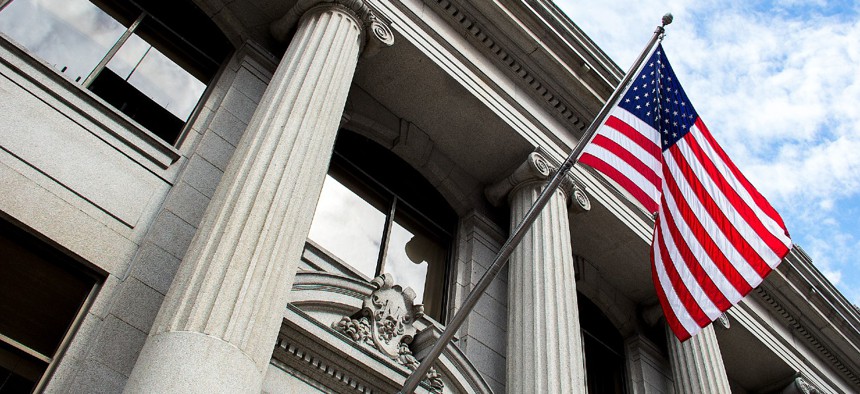
Jon Rehg / iStock.com
The Paywall That Continues to Stand in the Way of Government Transparency
Congress should act now to ensure Americans receive the free and unfettered online access to federal court records they deserve.
There are few principles more important to the American concept of government than transparency. The public literally and figuratively buys in to our government, and we expect that we will be able to see what our tax dollars have paid for. This transparency, and the oversight that facilitates it, is how we ensure that public resources are being used wisely and effectively. That is why the current paywall that exists between the public and federal court records is so appalling and why Congress should act to abolish it.
The Public Access to Court Electronic Records (PACER) system is the portal through which any member of the public may access federal court records. The system was created by the Judicial Conference in 1988, in an effort to modernize the way court records were managed and accessed. This was a worthy and laudable objective; the problem is, the PACER system comes with a paywall that currently charges $0.10 per downloaded page, up to $3 per document, and $2.40 per audio file download. Given that court cases can easily include hundreds of documents, these fees can really add up, making online access to court records a financial hardship for many everyday Americans—and even nonprofit organizations that play an important role in conducting oversight of the sprawling federal government.
Congress has already attempted to solve this issue once: In late 2020, the House passed a bill that would have made PACER free to most of the public and modernized the system to reflect 21st century digital and accessibility standards. That bill, the Open Courts Act, is set to be considered by the Senate Judiciary Committee this week, after having been reintroduced in both the Senate and the House earlier this year. Led by Sens. Rob Portman, R-Ohio, and Ron Wyden, D-Ore., in the Senate and Reps. Hank Johnson, D-Ga., and Darrell Issa, R-Calif., in the House, the Open Courts Act would remove the PACER paywall for most of the public, ensuring that the vast majority of us could access court records free of charge.
While the Open Courts Act passed the House last Congress with strong bipartisan support, federal courts have vigorously opposed efforts to reform PACER, including arguing that the paywall is essential to the existence of the system and that modernizing it would be extremely cost-prohibitive. But the nonpartisan Congressional Budget Office rebutted that false narrative: A 2020 analysis of the Open Courts Act found that modernizing the current system would cost a fraction of what the judiciary claimed it would. In fact, the judiciary has been credibly accused of using PACER funds for questionable purposes, well beyond the costs of maintaining the system itself. In August 2020, an appeals court ruled that the judiciary cannot use the funds derived from PACER fees as a “slush fund,” which it had been doing for years. While this case was recently settled and the terms of the settlement remain unknown, it is highly unlikely that this settlement removes the paywall. And this means that reform is still necessary. If the judiciary is truly “committed to creating a better PACER user-experience,” as the Administrative Office of the U.S. Courts claimed while lobbying against the bill, they should be working to fix the current untenable situation and cease opposing PACER reform with exaggerated and disingenuous talking points.
The federal judiciary receives about $8 billion in annual appropriations from Congress, funded entirely by taxpayer dollars. To charge hardworking Americans for court records that they already support with their tax dollars is unfair, especially when judicial branch transparency is an important piece of government oversight. Americans deserve free and unfettered online access to the records produced by our government, irrespective of which branch of government is producing those records. This is all the more true for folks who have an added interest in monitoring the activities of the federal courts, such as journalists, researchers and government watchdogs. Civil society groups, including the Project On Government Oversight and National Taxpayers Union, have also called attention to this issue and urged Congress to abolish the PACER paywall.
Americans from all points along the political and ideological spectrum have a vested interest in the government through their tax dollars; this, by definition, includes the federal courts. We therefore all have an interest in ensuring the most open and accessible government possible. No other branch of government charges us for access to public records: Congress doesn’t charge us money to read bills. Federal agencies don’t demand payment for the privilege of reading reports about how government projects function. We would, rightfully, not accept this barrier to public access, and the federal courts are no different. It is long past time for Congress to pass the Open Courts Act, abolish the PACER paywall, and make justice more accessible to all.
Dylan Hedtler-Gaudette is government affairs manager at the Project on Government Oversight, and Melissa Wasser is policy counsel at the organization. Andrew Lautz is director of federal policy at the National Taxpayers Union.






